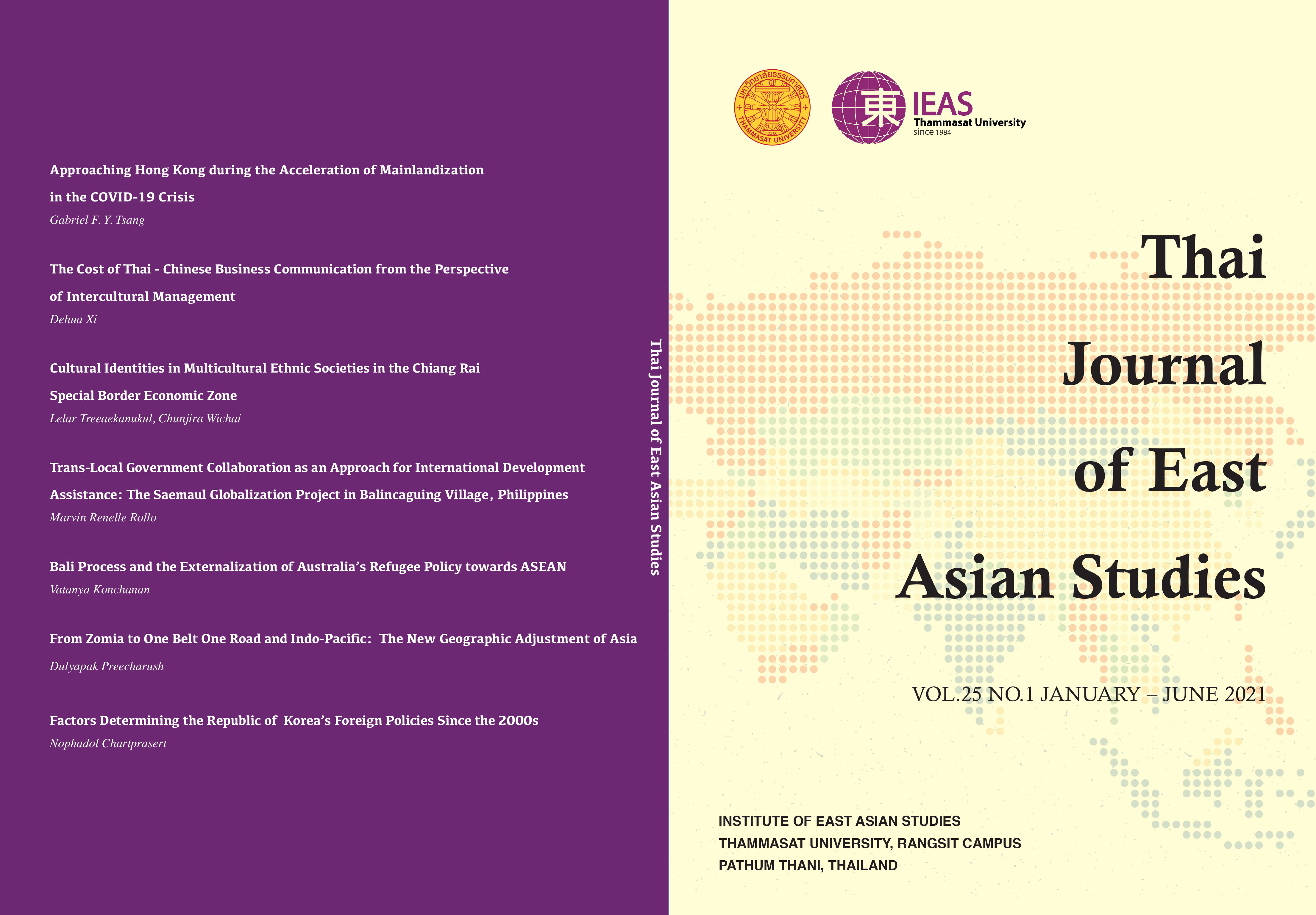Approaching Hong Kong during the Acceleration of Mainlandization in the COVID-19 Crisis
Keywords:
Mainlandization, COVID-19, contextualization, Hong Kong studiesAbstract
At present, there are much more clinical studies and sociological studies related to public health issues than humanities studies to conceptualise the sophisticated evolution or devolution of China during the pandemic. However, insufficient focuses have been laid on interrelated practices that the Chinese government executes while the public prioritized their personal health. Similar to the side-tracking strategy that President Donald Trump adopted to dissolve the internal dissent against him, Chinese leaders were also dedicated to launching new policies and manipulating political discourses to maintain stability and security, especially after a series of, what they consistently term, “riots” happening in Hong Kong since mid-2019.
This article is concerned with how local contexts, as a methodological core, help to raise multiple enquiries into the currently accelerated mainlandization of Hong Kong. It proposes that various stakeholders (the Chinese government, the Hong Kong Special Administrative Region government, and the pro-establishment Hong Kong public) are, no matter consciously or unconsciously, taking advantage of the public health crisis to move forward the central government’s progressive implementation of overall jurisdiction in response to the year-long social unrests caused by the controversial extradition law amendment, and Regional Studies scholars who care about China might reflect on contextual complicities to generate prospective perspectives.
Downloads
References
Bettinson, G. (2020). Yesterday once more: Hong Kong-China coproductions and the myth of mainlandization. Journal of Chinese Cinemas, 14(1), 16-31.
Chen, G., Hu, R., Wang, Y., Zhao, X., Zhou, Y., Song, D., Xia, J., Qin, Y., Chen, L., & Li, X. (2020). Recommendation from Peking Union Medical College Hospital for urgent hemodialysis during the COVID-19 pandemic. International urology and nephrology, 1–2.
Cheng, E. W. (2020). United Front Work and Mechanisms of Countermobilization in Hong Kong. The China Journal (Canberra, A.C.T.), 83(1), 1-33.
Cheung, T. & Natalie W. (2020). Coronavirus: Hong Kong residents unhappy with Covid-19 response – and surgical masks one big reason why, Post survey show. South China Morning Post, April 1, available at https://www.scmp.com/news/hong-kong/politics/article/3077761/coronavirus-post-poll-shows-hong-kong-residents-unhappy (accessed 17.05.2020).
Chou, K. (2011). Perceived discrimination and depression among new migrants to Hong Kong: The moderating role of social support and neighborhood collective efficacy. Journal of Affective Disorders, 138(1), 63-70.
Diaocha: Yu 9 cheng jiaoshi fandui quxiao wenping shi shiti renwei dui kaosheng bugong (Survey: Over 90% teachers object to the cancellation of the HKDSE question and think it is unfair to candidate). RTHK, 21 May 2020, available at https://news.rthk.hk/rthk/ch/component/k2/1527452-20200521.htm (accessed 17.05.2020).
International Social Service of Hong Kong. (1997). A Study on the Chinese new immigrants in Hong Kong. Hong Kong: International Social Service, Hong Kong Branch.
Isabella F. S. Ng, Siu-yau Lee, Winky K. F. Wong, & Kee-Lee Chou. (2015). Effects of Perceived Discrimination on the Quality of Life Among New Mainland Chinese Immigrants to Hong Kong: A Longitudinal Study. Social Indicators Research, 120(3), 817-834.
Kang, D., Choi, H., Kim, J. H., & Choi, J. (2020). Spatial epidemic dynamics of the COVID-19 outbreak in China. International Journal of Infectious Diseases 94, 96-102.
Lam, J. (2020). Rebel City Hong Kong's Year of Water and Fire. World Scientific Publishing Co and South China Morning Post.
Lam, J., Sum, L., & Ng, K. (2019) Hong Kong elections: pro-democracy camp wins 17 out of 18 districts while city leader says she will reflect on the result. South China Morning Post, 25 November, available at https://www.scmp.com/news/hong-kong/politics/article/3039151/hong-kong-elections-tsunami-disaffection-washes-over-city (accessed 14.07.2020).
Lo, S., Yat, Y. W., Kwan, K. K., & Kwok, W. W. (2005). Guest Editors' Introduction : The 2004 Legislative Council Elections in Hong Kong: The Triumph of China's United Front Work After the July 2003 and 2004 Protests. Chinese Law & Government, 38(1), 3-29.
Low, Y. A., Busiol, D., & Lee, T. Y. (2016). A review of research on civic and political engagement among Hong Kong youth. International Journal of Child and Adolescent Health 9 (4), 423-432.
Lyman, V. S. (1967). Enemies and Friends: The United Front in Chinese Communist History. Stanford University Press.
Ping, Y. C. & Kwong, K. (2014). Hong Kong Identity on the Rise. Asian Survey 54 (6), 1088–1112.
Qi, H., Xiao, S., Shi, R., Ward, M. P., Chen, Y., Tu, W., ... & Zhang, Z. (2020). COVID-19 transmission in Mainland China is associated with temperature and humidity: A time-series analysis. Science of the Total Environment 728, 1-6.
Report of the Subcommittee on Proposals on the Method for Selecting the Chief Executive in 2017. Legislative Council, available at: https://www.legco.gov.hk/yr14-15/english/hc/papers/hc20150605cb2-1667-e.pdf (accessed 13.07.2020).
Tu, X. (2018). Case Study—Co-Production of New Immigrant Services in Hong Kong. In Brandsen, T., Verschuere, B, & Steen, T. (Eds.) Co-Production and Co-Creation: Engaging Citizens in Public Services (pp. 252-254). Routledge.
Valjakka, M. (2015). Urban Art Images and the Concerns of Mainlandization in Hong Kong. In Bracken, G. (Ed.), Asian Cities: Colonial to Global (pp. 95-122). Amsterdam University Press.
Veg, S. (2016). Creating a Textual Public Space: Slogans and Texts from Hong Kong's Umbrella Movement. The Journal of Asian Studies, 75(3), 673-702.
Wang, R. & Groot, G. (2018). Who Represents? Xi Jinping’s Grand United Front Work, Legitimation, Participation and Consultative Democracy. The Journal of Contemporary China, 27(112), 569-583.
Wong, L. K. (2020). Zhang Bingliang: guo’an lifa hou xu jie “puxuan jie” ge zou jiduan de ge ju zhengzhi chongjian hua fenqi (Anthony Cheung Bing-leung: necessity to untie the knot of “universal suffrage;” extremists gain nothing but political reconstruction can resolve dissensus). Hong Kong Economic Journal, June 26, available at https://www1.hkej.com/features/article?q=%23%E6%B8%AF%E7%89%88%E5%9C%8B%E5%AE%89%E6%B3%95%E6%9C%80%E6%96%B0%E7%99%BC%E5%B1%95%23&suid=2537123171 (accessed 15.07.2020).
Wong, N., Cheung, G., & Sum L. (2020). Beijing’s liaison office says it has right to handle Hong Kong affairs, as provided by constitution and Basic Law. South China Morning Post, April 17, available at https://www.scmp.com/news/hong-kong/politics/article/3080506/beijings-liaison-office-says-it-has-right-handle-hong-kong (accessed 17.05.2020).
Yan, A., Zou, Y., & Mirchandani, D. A. (2020). How hospitals in mainland China responded to the outbreak of COVID-19 using IT-enabled services: an analysis of hospital news webpages. Journal of the American Medical Informatics Association 0 (0), 1-9.
Zamecki, L. (2020). “Mainlandization” of Hong Kong, A Model of Influence, Resistance and Adjustment. Revista UNISCI, (53), 221-240.



